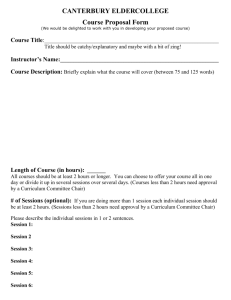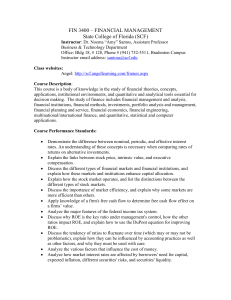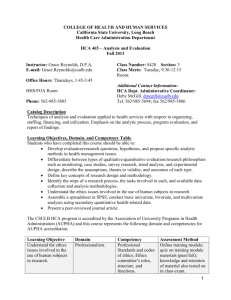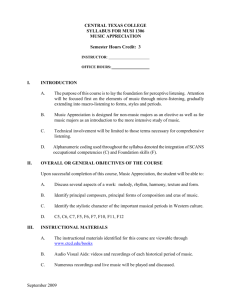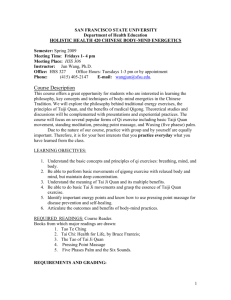Syllabus
advertisement
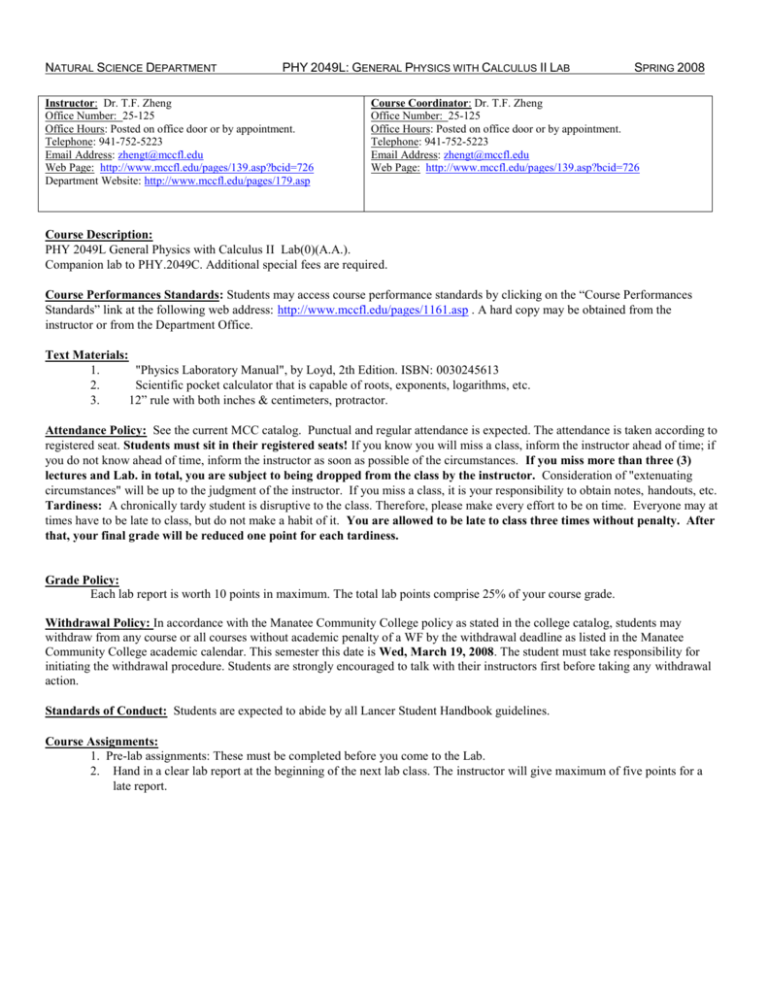
NATURAL SCIENCE DEPARTMENT PHY 2049L: GENERAL PHYSICS WITH CALCULUS II LAB Instructor: Dr. T.F. Zheng Office Number: 25-125 Office Hours: Posted on office door or by appointment. Telephone: 941-752-5223 Email Address: zhengt@mccfl.edu Web Page: http://www.mccfl.edu/pages/139.asp?bcid=726 Department Website: http://www.mccfl.edu/pages/179.asp SPRING 2008 Course Coordinator: Dr. T.F. Zheng Office Number: 25-125 Office Hours: Posted on office door or by appointment. Telephone: 941-752-5223 Email Address: zhengt@mccfl.edu Web Page: http://www.mccfl.edu/pages/139.asp?bcid=726 Course Description: PHY 2049L General Physics with Calculus II Lab(0)(A.A.). Companion lab to PHY.2049C. Additional special fees are required. Course Performances Standards: Students may access course performance standards by clicking on the “Course Performances Standards” link at the following web address: http://www.mccfl.edu/pages/1161.asp . A hard copy may be obtained from the instructor or from the Department Office. Text Materials: 1. "Physics Laboratory Manual", by Loyd, 2th Edition. ISBN: 0030245613 2. Scientific pocket calculator that is capable of roots, exponents, logarithms, etc. 3. 12” rule with both inches & centimeters, protractor. Attendance Policy: See the current MCC catalog. Punctual and regular attendance is expected. The attendance is taken according to registered seat. Students must sit in their registered seats! If you know you will miss a class, inform the instructor ahead of time; if you do not know ahead of time, inform the instructor as soon as possible of the circumstances. If you miss more than three (3) lectures and Lab. in total, you are subject to being dropped from the class by the instructor. Consideration of "extenuating circumstances" will be up to the judgment of the instructor. If you miss a class, it is your responsibility to obtain notes, handouts, etc. Tardiness: A chronically tardy student is disruptive to the class. Therefore, please make every effort to be on time. Everyone may at times have to be late to class, but do not make a habit of it. You are allowed to be late to class three times without penalty. After that, your final grade will be reduced one point for each tardiness. Grade Policy: Each lab report is worth 10 points in maximum. The total lab points comprise 25% of your course grade. Withdrawal Policy: In accordance with the Manatee Community College policy as stated in the college catalog, students may withdraw from any course or all courses without academic penalty of a WF by the withdrawal deadline as listed in the Manatee Community College academic calendar. This semester this date is Wed, March 19, 2008. The student must take responsibility for initiating the withdrawal procedure. Students are strongly encouraged to talk with their instructors first before taking any withdrawal action. Standards of Conduct: Students are expected to abide by all Lancer Student Handbook guidelines. Course Assignments: 1. Pre-lab assignments: These must be completed before you come to the Lab. 2. Hand in a clear lab report at the beginning of the next lab class. The instructor will give maximum of five points for a late report. EXP LABORATORY SCHEDULE TOPIC PRE-LAB POST-LAB ------- ------------- Week Week 1 Week 2 Week 3 Week 4 Week 5 Week 6 Week 7 Week 8 Week 9 Week 10 1 Comp. 5 40 41 Problem 1 Week 11 Week 12 Week 13 Week 14 Week 15 Week 16 29 Comp.6 Problem 3 28 Problem 2 34 Problem 4 Review Sound Reflection & Refraction Thin Lens System & Optical Bench Wave & Optics Research Lab 1 Research Lab 2 Ohm's Law Electric Force, Field, Potential Kirchhoff’s Rules Spring Vacation Circuit Lab 1 RC Circuit DC Circuit Circuit Simulation Magnetism Make-up Lab Chap. 16, 17, 35, 36, 37 ------Chap. 23, 24, 25, 26 ----Chap.27, 28 Chap.29-32, 40 --- ----------------- Additional Information: The aim of the laboratory exercise is to give the student an insight into the significance of physical ideas through actual manipulation of apparatus, to bring him or her into contact with the methods and instruments of physical investigation, and to explore new technology application in science. Each exercise is designed to teach or reinforce an important law of physics which, in most cases, has already been introduced in the lecture and in the textbook. Thus the student is expected to be acquainted with the basic ideas and terminology of an experiment before coming to the laboratory. The exercises in general involve measurements, graphical representations of the data, and calculation of a final result. The students should bear in mind that in many cases the instruments provided are not precision instruments and in consequence no very great importance can be attached to the accuracy of the final numerical result. The success of an experiment lies rather in the degree to which the student has: 1. mastered the physical principles involved. 2. understood the theory and operation of instruments employed. 3. realized the significance of the final conclusions.



